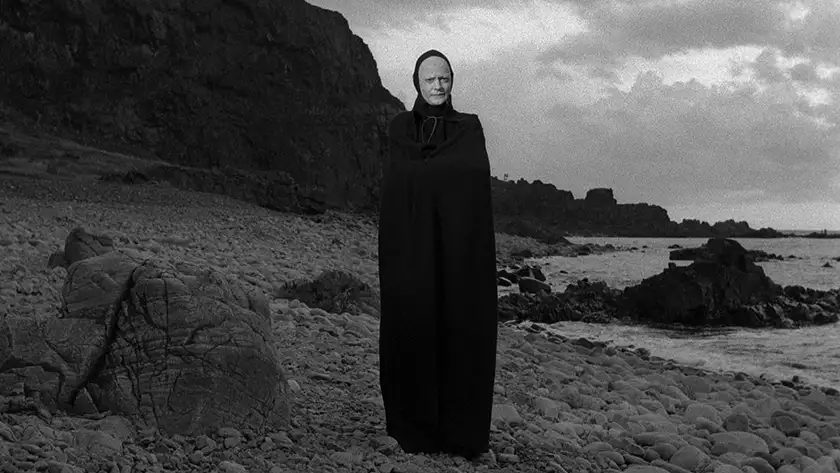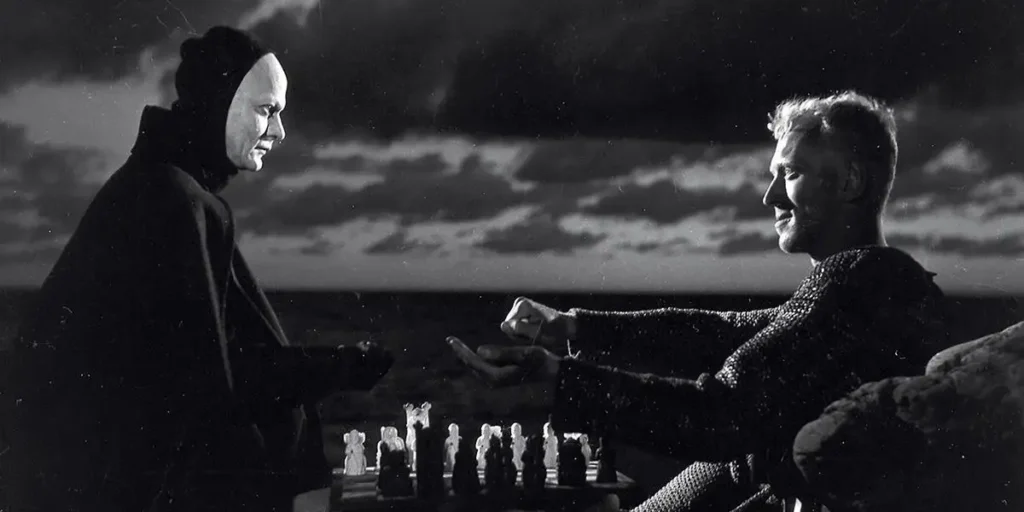Ingmar Bergman’s The Seventh Seal is a cinematic masterpiece that marks the director’s foray into existential themes and memorable visuals.
Director: Ingmar Bergman
Genre: Psychological Drama
Run Time: 98′
U.S. Release: October 13, 1958
U.K. Release: March 1958
Where to Watch: on digital & VOD
Ingmar Bergman is perhaps one of the most influential directors of all time. The Swede’s work ruminates on existentialism, on themes of life and death and morality, and one of his most famous works – and the first of his film’s to do so – is historical fantasy The Seventh Seal (Det Sjunde Inseglet). So named after a passage in the Book of Revelations, it is, quite simply, a masterpiece.
As an allegory for man’s relationship with faith and the search for meaning, it is thematically complex despite being superficially quite simple, and quietly stunning as a result.
Upon their return home after the Crusades, disillusioned knight Antonius Block (Max von Sydow) and his squire Jöns (Gunnar Björnstrand) find their country desolate and ravaged by the black plague. They happen upon a mysterious cloaked figure along the shore, whom they come to learn is Death (Bengt Ekerot), and Antonius – ravaged by his own experiences and religious doubt – challenges him to a chess game, in the hopes of evading his fatal clutches and solving his own existential dilemmas.
The image of Death and Antonius playing chess is one of Bergman’s most recognisable, even if a lot of audiences may only recognise it via Bill & Ted’s Bogus Journey. It is a beautifully simple motif, executed (by Bergman, not Bill and Ted) without a hint of silliness, even if the image itself is truly quite bizarre. It allows both the filmmaker and the audience to ruminate on the philosophical questions that The Seventh Seal is asking, questions like ‘is there a higher power?’ and ‘what will happen to those who don’t or are incapable of believing when they die?’.
And it also encapsulates the way Bergman approaches a lot of the film’s themes and their opposing natures. Faith and atheism, life and death, piety and hypocrisy; every duality is explored through the battle of skill and wills with Death, interspersed by the stories of the people Antonius and Jöns meet as they travel. But under Bergman’s confident hand, these lofty topics never feel overwhelming. Everything about the film feels meticulous and elegantly crafted so as not to feel like it’s trying too hard to be philosophical. It is deceptive in its simplicity and disciplined in its execution.

There’s a power to The Seventh Seal that creeps up on you, especially when approached with an open mind. It’s easy to dismiss films held in incredibly high regard, particularly those released over 65 years ago, as being seen through a sentimental lens, looked at and lauded for their impact rather than their substance. But Bergman’s film absolutely holds up. It is subtle, poetic, dramatic and, yes, a bit daft, but everything works. Its fantastical elements diffuse the weight of its themes without diluting them; the film – and, by extension, Bergman – is not trying to bombard the audience with overwrought religious allegory and existentialism, but rather to entertain them, encouraging introspection and consideration by the film’s end.
The Seventh Seal is one of cinema’s simplest and yet most delightfully complex offerings. It led to Bergman embracing his craft as a means of dissecting incredibly complex themes in ways that are accessible to those who are open to doing so. It’s a masterpiece of filmmaking from a master of the profession, and remains an impactful viewing experience even if you can’t tell a knight from a rook.
The Seventh Seal is now available to watch on digital and on demand. Read our reviews of Ingmar Bergman’s Scenes from a Marriage and Fanny and Alexander!

